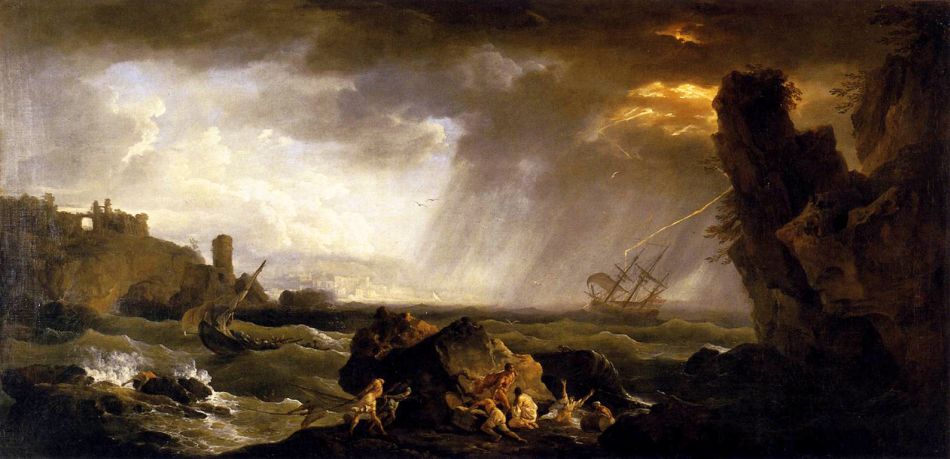DAWN
Daily Arts Web Nucleus
Discover the Arts! Each day a different image from the Literary, Performing, or Visual Arts representing a portion of Scripture plus an explanation with links 2015 January 17
Seascape: Tempest (1735-1740)
Claude-Joseph Vernet (1714-1789)
Proto-Romantic Style; Sturm und Drang Period
Musee du Louvre, Paris, France
Image Source: Web Gallery of Art
Explanation: In Job 27 Job continues his final argument in defense of his innocence. The painting above depicts a tempest, which is one of the things that would come upon the wicked, as Job observed.
[ THEMATICALLY AND CHRONOLOGICALLY RELATED SCRIPTURES: Job 25. Job 26. Job 28. Job 29. Job 30. Job 31. ]
[ CHRONOLOGY: General. Patriarchs (Traditional). Judges # 1. Judges # 2. Kings # 1. Kings # 2. Prophets # 1. Prophets # 2. NT # 1. NT # 2. NT # 3. ]
[ MAPS: Maps # 1. Maps # 2. Maps # 3. Maps # 4. Maps # 5. ]
The first verse says that Job continued his parable. This seems to imply a pause after the words of chapter 26. Some commentators think that Job may have waited for Zophar's third reply. This did not come. As Job continued his final defence (Hebrew, "mashal," parable, oracle, or weighty discourse), he accused God of taking away his judgment and vexing his soul. Here Job charges God foolishly, something which he had avoided up till this point (Job 1:22; Job 2:10). Nevertheless, as the remainder of his discourse shows, he did not repudiate God, as Satan claimed he would (Job 1:9-11; Job 2:4-5); rather, he still clung to God (1-2). Job then told his friends that he would continue to assert his integrity and to deny the assertions of his friends (3-6). He then stated his desire that his enemies (meaning, perhaps, his accusers, or, perhaps, including them) would suffer the judgments of the wicked and the unrighteous. As for Job, he would teach his friends by the hand of God and would reveal to them the things which were with the Almighty (particularly the verdict of his innocence); indeed, said Job, they had already seen this truth; so he asked them why they were so empty in their accusations (7-12). Job then warned them about the fate of wicked oppressors (which, by implication, would be their fate if they continued to wickedly oppress Job by false accusations). The children of the wicked would be afflicted by the sword, and famine; and they would die unburied and without being mourned by their widows. Their riches and their garments would be given to the righteous. Their houses would be flimsy. They would lie down rich and wake up as nothing (i.e., poor, destitute). They would experience a flood of terrors; and a tempest would take them away in the night and cast them out of their place. God would not spare them; men would shoo them away with clapping of hands and hissing -- the way small animals are frightened away (13-23).
Job 27
1 Moreover Job continued his parable, and said,
2 As God liveth, who hath taken away my judgment; and the Almighty, who hath vexed my soul;
3 All the while my breath is in me, and the spirit of God is in my nostrils;
4 My lips shall not speak wickedness, nor my tongue utter deceit.
5 God forbid that I should justify you: till I die I will not remove mine integrity from me.
6 My righteousness I hold fast, and will not let it go: my heart shall not reproach me so long as I live.
7 Let mine enemy be as the wicked, and he that riseth up against me as the unrighteous.
8 For what is the hope of the hypocrite, though he hath gained, when God taketh away his soul?
9 Will God hear his cry when trouble cometh upon him?
10 Will he delight himself in the Almighty? will he always call upon God?
11 I will teach you by the hand of God: that which is with the Almighty will I not conceal.
12 Behold, all ye yourselves have seen it; why then are ye thus altogether vain?
13 This is the portion of a wicked man with God, and the heritage of oppressors, which they shall receive of the Almighty.
14 If his children be multiplied, it is for the sword: and his offspring shall not be satisfied with bread.
15 Those that remain of him shall be buried in death: and his widows shall not weep.
16 Though he heap up silver as the dust, and prepare raiment as the clay;
17 He may prepare it, but the just shall put it on, and the innocent shall divide the silver.
18 He buildeth his house as a moth, and as a booth that the keeper maketh.
19 The rich man shall lie down, but he shall not be gathered: he openeth his eyes, and he is not.
20 Terrors take hold on him as waters, a tempest stealeth him away in the night.
21 The east wind carrieth him away, and he departeth: and as a storm hurleth him out of his place.
22 For God shall cast upon him, and not spare: he would fain flee out of his hand.
23 Men shall clap their hands at him, and shall hiss him out of his place.
ADDITIONAL AD LIB MATERIAL: Prose, Poetry, Writers, Visual Artists, Music, DAWN, and ILLUMINATION. ILLUMINATION features a compact, Illuminated Bible. DAWN, the page you are presently visiting, features a new image and explanation daily.
Please Email Comments and Questions To
AD LIB ARTS EMAIL
copyright 2014, Scott Souza
|
